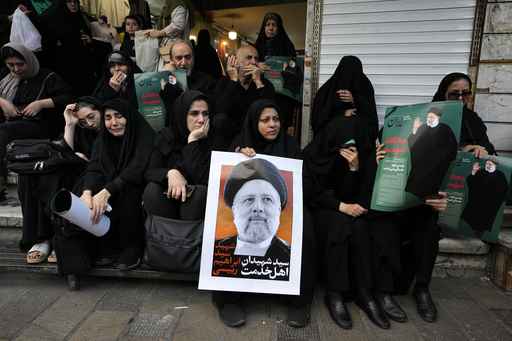UNITED NATIONS (AP) — The U.N. General Assembly’s tribute to Iran’s late President Ebrahim Raisi was snubbed by Western and East European nations on Thursday amid protests against honoring a leader who was reviled for his crackdown on opponents.
The assembly’s tribute was no surprise. It is a longstanding practice that the 193-member world body holds a plenary meeting to pay tribute to the memory of a sitting head of state who dies, where all U.N. regional groups send representatives to speak about their life and legacy. And there were some warm tributes to Raisi, especially from African nations.
But what happened Thursday that was highly unusual was that only representatives from the African, Asian-Pacific, and Latin American and Caribbean regional groups spoke. There were no remarks from the West European or East European groups, or from the United States, which normally speaks last representing the host country.
“The United States will not attend today’s United Nations tribute event for President Raisi in any capacity,” Nate Evans, spokesperson for the U.S. Mission to the U.N. said. “Raisi was involved in numerous, horrific human rights abuses, including the extrajudicial killings of thousands of political prisoners in 1988. Some of the worst human rights abuses on record took place during his tenure.”
“The U.N. should be standing with the people of Iran,” Evans said in a statement.
While the tribute was taking place in the assembly chamber, more than 100 protesters held banners across the street from U.N. headquarters saying, “Shame on U.N. holding memorial for Raisi, Butcher of Tehran,” and chanting similar words.
Before the assembly met, 45 current and former U.N. officials, experts, ambassadors and judges sent a joint letter to U.N. Secretary-General António Guterres protesting the tribute to an individual involved in mass atrocities.
Raisi, 63, a powerful figure in Iran’s authoritarian Islamic government, was killed in a helicopter crash on May 20 along with the country’s foreign minister and six others.
He had long been considered a potential successor for Iran’s supreme leader, 85-year-old Ayatollah Ali Khamenei, in whose hands power ultimately rests, but was reviled by opponents, and sanctioned by the U.S., for his role in mass executions of political prisoners at the end of Iran’s long war with Iraq in the 1980s.
Many also hold Raisi responsible for the death of Mahsa Amini, who died in police custody in September 2022 after being detained for allegedly violating Iran’s mandatory headscarf law. Amini’s death sparked mass protests against the country’s ruling theocracy, and a security crackdown that saw more than 500 people killed and over 22,000 detained.
On Thursday, General Assembly President Dennis Francis opened the meeting offering the world body’s “deepest condolences to the government and people of Iran.”
Throughout his career, Francis said, “president Raisi held significant roles in Iranian society and government – and as president, led his country’s contribution to shape the tenets of our multilateral system and international cooperation.”
Secretary-General Guterres then spoke, also offering condolences and said Raisi “led Iran at a challenging time for the country, the region and globally” – but skipping a tribute.
Guterres assured the Iranian people the United Nations stands with them “and in the quest for peace, development and fundamental freedoms.”
He was followed by Burundi’s Ambassador Zéphyrin Maniratanga who spoke on behalf of African nations and praised Raisi as a “distinguished leader who devoted his life to serving his nation and fostering international cooperation particularly with African countries.”
“The late president Raisi was a visionary leader whose dedication to the principles of equity, brotherhood, solidarity and multilateralism was evident throughout his tenure,” he said, citing Iran’s expanded trade, education and health services in Africa.
Vanuatu diplomat Marjorie Wells, speaking for the Asia-Pacific group, then spoke, calling Raisi’s death a “heartbreaking loss,” saying he served the Iranian people “with great dedication and passion” and “worked tirelessly to promote growth, justice and progress.”
Haiti’s U.N. Ambassador Antonio Rodrigue, speaking for the Latin America and Caribbean group, called Raisi’s death “a great loss” for Iran, recounting his career and saying “he dedicated his life to the service of his country.”
The West and East European and the U.S. should have followed. Instead, Assembly president Francis then gave the floor to the Organization of Islamic Cooperation and the Nonaligned Movement which Iran belongs to for tributes that praised Raisi.
The final speaker from the Gulf Cooperation Council, which includes Iran’s rival Saudi Arabia, said Raisi served his country and sent condolences to the Iranian people and leadership saying: “We belong to Allah and to Him we shall return.”



